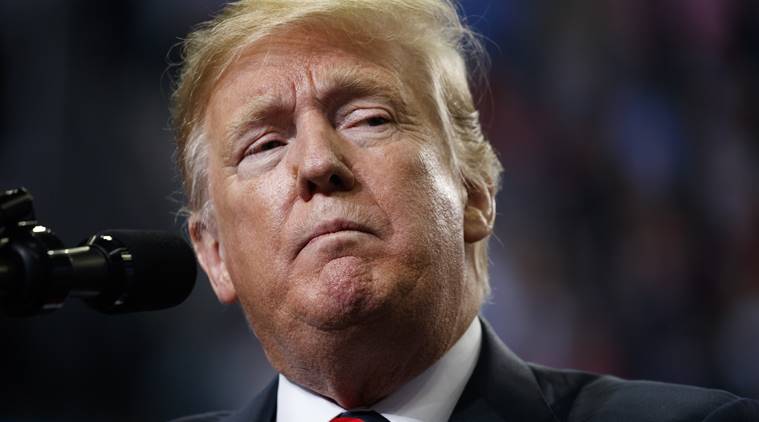Midterm elections: A bruised Trump
The next two years of his presidency have now run into democratically created counter-power.

Trump engaged in suspect tax schemes as he reaped riches from his father
Within two years of Donald Trump’s stunning rise to power, America’s political landscape has changed, substantially if not wholly. Last week’s midterm elections have, yet again, proved that democratic politics can be open-ended, even in the short run. Unless unusual circumstances prevail, long-term political hegemony is hard to construct in democracies.
Consider what has already happened, as last votes for several seats come in (or are recounted). Flipping nearly 40 seats in the lower House, the highest since the 1974 midterms that took place soon after the resignation of Richard Nixon under the threatening shadow of impeachment, the Democrats have wrested control of the House of Representatives. At the state level, seven governorships have changed hands, giving Democrats gubernatorial control in 23 states, up from 16. That is nearly half of the 50 states. Unlike Indian governors, US governors are directly elected, and are equal to India’s chief ministers, exercising real power. Democrats have also flipped over 300 state legislative seats.
The US Senate escaped what now looks like a democratic wave. Its Republican majority will either remain unchanged, or might be somewhat enhanced. Why did the Senate remain impervious? Unlike the House, it is not a fully representative body. If the House works on a nationwide principle of one-person-one-vote, the Senate is premised upon the idea of equality of states, meaning two seats for each state, small or big. For the Senate, the one-person-one-vote principle operates at the state level, not the national level.
A mammoth state like California has 53 seats (out of 435) in the House, but only two in the Senate. And a tiny state like Vermont has only one seat in the House, but two in the Senate. Vermont is, of course, not alone. Five other states display the same pattern (one House seat; two senate seats): Wyoming, Montana, North Dakota, South Dakota, and Delaware. Thus, a party can lose popular vote but may still control the Senate, if the smaller states deviate from the larger ones. A version of the same principle led to Trump’s victory two years back. He lost to Hillary Clinton by 3 million votes, but won the presidency because he triumphed in key states, winning their votes in the electoral college.
Of these developments, the most critical in the near term is the Democratic control of the House. Unlike the Westminster system, which India follows, legislatures in presidential systems have critical investigative powers vis-à-vis the executive. To check and balance the executive, and to curtail the abuse of power and corruption, the Constitution gives the legislative committees enormous legal teeth.
We not only have the new possibility of executive-legislative policy battles over immigration, healthcare, minimum wages, etc, which can derail Trump’s ideological agenda. In the current circumstances, these committees can also force inquiries into matters of a more personal nature. House committees can require that President Trump not stop, or curtail, the ongoing Russia investigations, where the possibility of Trump’s collusion, a crime under US law, is the crux of the matter. The House can also force open for scrutiny his tax returns, which he has not done since the mid-1990s (his business transactions might reveal his Russia connections).
There may also be a probe into whether his family has received illegitimate, possibly illegal, business benefits since his arrival in the White House. Finally, with a simple majority, the House has the power to impeach him, though it is most unlikely that he can be ousted from office, as the latter also requires a super majority in the Senate, which Republicans control.
How has Trump reacted thus far?
Trump’s utterances and actions have been a mixture of delusion, bravado and defensiveness. He first called the results “tremendous”, “nearly perfect”, pointing especially to the victory in the Senate. While the latter undoubtedly makes it easier for him to make key appointments, especially in the judiciary, he entirely ignored the investigative implications of a Democratic majority in the House. His assessment, if not delusional, was perhaps based on the echo chamber his advisors have become, telling the boss only what he would like to hear, never frankly conveying the bad news, always spinning it for the president’s ears, half-believing the spin themselves.
Trump also quickly fired the Attorney General, who presides over the Department of Justice, which is formally supervising the Russia investigations. These investigations have already led to the indictments of, or guilty pleas by, many of Trump’s campaign and business associates. The person Trump appointed as acting Attorney General, the highest law-enforcement officer of the land, has never been approved by the Senate, normally a requirement for holding a high office. His principal qualification appears to be that he has made vigorous public statements against the validity, or scope, of the Russia investigations. Trump perhaps thinks his appointment can alter the remaining parts of the inquiry, or pre-empt a finding about his culpability, if one were likely. But we also know that a House committee, soon after it is formed in early January, can start probing whether the acting Attorney General interfered in the Russia inquiry and can force him to testify under oath, including punishment for perjury. Obstructing Russia investigations can lead to serious political and, possibly, legal costs.
Much has been made in the press, virtually all over the world, about Trump’s open post-midterm clash with journalists. However hurtful and ethically troublesome Trump’s remarks were about the bias or “stupidity” of some journalists, that is perhaps not an issue of qualitatively novel importance. Other than Fox News, his relationship with the press has long been conflictual. In the recent clashes, the conflict simply acquired a naked form. But it will not stop the CNN, New York Times, Washington Post from pursuing the path of speaking truth to power and exposing what needs to be brought out. They simply won’t tremble in fear.
In sum, the next two years of the Trump presidency have now run into what might be called democratically created counter-power. Fierce political battles lie ahead.
The writer is director, Centre for Contemporary South Asia, Sol Goldman Professor of International Studies and Social Sciences, Watson Institute for International and Public Affairs, Brown University.







































No hay comentarios:
Publicar un comentario